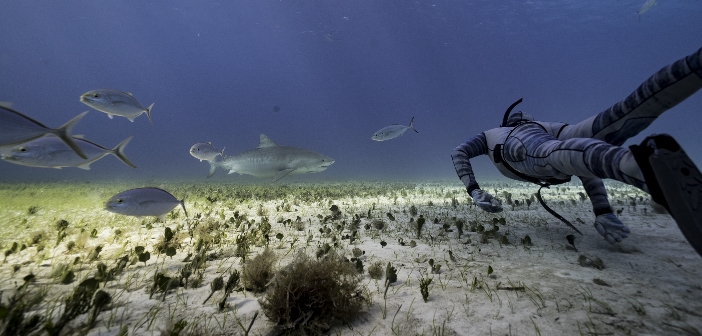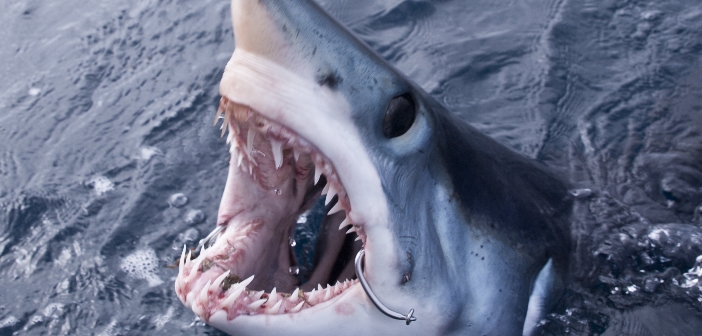Riley Elliott dares to go where many others would not – face to face with the apex predator of the ocean – all in the name of science. Justin Felix explains.
The thought of being dropped in the middle of shark rich waters is enough to incite fear in even the bravest man. In fact, it’s probably something we’ve all had nightmares about. JAWS has a lot to answer for. Thanks Spielberg!
It isn’t hard to be inquisitive about animals and the natural world though. Who doesn’t love David Attenborough after all? I personally wish he was my grandfather. Imagine story time… but I won’t bore you with the contents of that dream.
Instead, I want to introduce you to a man who turned his passion for Mother Nature and her ‘men in grey suit’ creations into a career most would admire but never entertain the thought of themselves.
Riley Elliott, like most, had a fear of sharks and after studying and swimming with them for 10 years, he still does. But the sheer awe they elicit is far greater than the sum of his fears. Perhaps the fact he was ingrained with a zest for adventure and wildlife from an early age helps.

“I was born in Vancouver and moved to New Zealand at five. I guess I was taken from a terrestrial environment where there were bears, cougars and myriad big creatures to an island at the bottom of the south pacific where there’s no choice but to explore the ocean,” Riley says.
Growing up around the ocean, his whole upbringing was stimulated by nature, knowledge and adventure; creating an ever-growing lust for new experiences, which has resulted in him exploring over 60 countries around the globe to surf, dive and experience diverse cultures.
It is one thing to be fascinated by sharks, but to take it to that next level and actually come face to face with them, minus a cage for protection, is something else.
“My love of surfing sparked the interest in the animals. As a surfer you’re always thinking about, or trying not to think about, the potential man in the grey suit below you,” Riley says.
“Like everyone else, I had a fear of sharks, and I guess I still do when I surf because the more you learn about them, the more you realise you’re doing everything wrong. As surfers we’re actually doing everything to encourage these animals to come and bite us.”
“I saw a shark for the first time when I was 18. I was completing my Masters degree, studying an endangered population of dolphins in Fiordland’s Doubtful Sound, NZ and came across a two foot school shark and I shit myself,” he laughs.
Riley went back to university, saw a flyer on the wall advertising Great White shark studies in South Africa and took the opportunity with both hands. With obvious passion and talent in the field he was invited to stay on and help run the Oceans Research Great White Shark program. And that’s where his love of surfing and fascination for sharks began to culminate into something much greater.
By applying academic principles from university, with real world field experience, Riley excelled in the shark research environment. With unbelievable stories such as a four metre Great White shark jumping into his research vessel, to free-diving without a cage with 29 of the world’s most dangerous shark species, Riley found his niche.
‘Fear to fascination’ became his life motto and the Shark Man was born.
Now, it’s become Riley’s mission to educate society based on scientific facts and visual imagery, rather than allow their minds to be filled with over sensationalised and dramatised media hype.
“I was brought up in a family of academics and if my dad used a big word I didn’t understand, he’d make me get up from the dinner table, grab a dictionary and read out the definition to everyone. That way I got the factual information and I wouldn’t forget it because it was from a source,” Riley says.
“These days’ people rely on Facebook for their information. It’s generally non-scientific rubbish. People are knowingly getting the wrong information everyday and when it comes to us ruining our earth and wiping out animal species that keep environments healthy, it’s a really naive approach.
“As a scientist it is your role to communicate the understanding that you have. For me it just happens to be sharks and they are the absolute of misconception. I use what skills I have and communicate stories that I have through various media.”

While Riley is first and foremost a marine biologist, he has communicated the overarching message of conserving the natural world through the writing of his own book, speaking at public events (including a TED talk in Auckland), appearing in countless radio, TV and magazines articles, giving the media experience to film a 10 part TV documentary series on sharks – two of which went direct to governments to improve legislation. He is drafting a children’s book and is commencing work on an international TV series about endangered animals, broadening his reach beyond sharks.
Riley’s ‘science for people’ approach took him to Western Australia with Hawaii’s Ocean Ramsey to help end the WA shark cull, where fear instead of science, drove politicians to some extremely controversial decisions. To make their mark, Riley and Ocean literally jumped in and resuscitated a three metre tiger shark, left for dead from a hook set by the Fisheries drum-line culling program.
Through stimulating imagery, captured by the various news helicopters flying overhead, once word got out that a man and woman were resuscitating a shark in the sea, the opportunity arose to convey objective science through the media that in the end helped ban the WA Shark Cull.
Before any up close and personal encounters, Riley and his crew spend a good 30 minutes to an hour observing the animals before jumping in. As he explains, there are just some animals you don’t want to be in the water with.
While this all sounds good in theory, animals can be highly unpredictable and there is always the chance of one of those sharks you don’t want to be stuck in the water with, turning up.
“When sharks are in an investigatory mode, which is the majority of the time, they approach an object and try to work out what it is, before taking a bite. If you had an electric fence there that gave them an unpleasant experience before they got to take that inquisitive bite, they’d most likely turn away. That’s why I use a product called Shark Shield.”
Shark Shield provides a periphery of around four metres which humans can’t feel but sharks can. It gives them a shock that overstimulates the sensory system. It doesn’t damage them, but does put them in an uncomfortable position and curbs their curiosity quick smart.
Riley believes that if Mick Fanning was wearing a Shark Shield on that famous day, that shark would not have launched out at Mick like it did. Such is the confidence he places in the product.
“Once we arrive at our destination, we do our utmost best to avoid scaring the sharks away. We want them to feel comfortable with us as some of them have never seen a human or boat before. We use blood and guts to attract them but it’s an unnatural feeding experience for them so I somewhat have to gain their trust.”
To gain that trust, Riley has a set routine in place, which you’ll no doubt agree, takes balls of steel to put into practice.

“I hug the hull of the boat when I get in the water and sort of curl up into a ball and avoid looking at them or venture out into their area until they get used to me. I adjust my behaviour according to their body language which is something I’ve learnt to read over the years. I can pick up on things like whether they’re confident or scared and alter my movements to suit until we reach a point where we can coexist; that’s when the magic happens.”
It is at this point, as Riley explains, when touching the animal and capturing close cinematic experiences, that we all love to watch on the big screen, becomes possible.
“Being a free diver means I tend to do some deep yoga-like breathing before jumping in the water, but to be honest, these animals have such a presence that when you see one, you can’t help but feel overawed. You seriously forget that you’re trying to hold your breath.
“You forget that you are in the middle of the ocean and you’ve just spilled blood and guts in the water for hours. All you can think about is eye contact with the animal because there is nothing more evolved on earth. As soon as you see one underwater you’ll never think of them in the same way. And you’ll want to do it again and again.
“That’s why shark eco tourism is booming all over the world and is ultimately saving sharks all over the world, because they are worth more alive than dead.”




